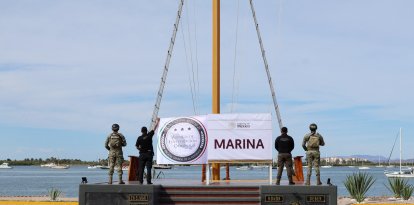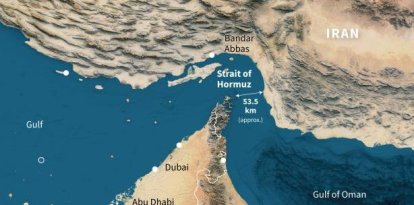Another blow to Maduro's regime: Trump to ask more companies to stop operating in Venezuela
Some of the companies that have reportedly already been informed of Trump's order include French oil company Etablissements Maurel & Prom SA and an asphalt company run by Harry Sargeant.

US President Donald Trump speaks during the National Prayer Breakfast at the US Capitol in Washington, DC.(Photo by Mandel NGAN / AFP)
According to an article from Bloomberg published on Friday, President Donald Trump's administration is reportedly on the verge of forcing other major companies to cancel all their operations in Venezuela, after ordering oil giant Chevron to end its operations in the South American country, in what clearly represents a blow to the socialist regime of dictator Nicolás Maduro.
Some of the companies that have reportedly already been informed of Trump's order include both the French oil company Etablissements Maurel & Prom SA and an asphalt company run by Harry Sargeant, who is a Republican lobbyist who has been lobbying for Trump recently to materialize a deal with Maduro, through which the latter could receive Venezuelan deportees in exchange for lifting oil sanctions. Bloomberg explained that the Republican administration informed these companies that they would have no more than 30 days to cancel their operations in Venezuela, after Trump officially revokes their permits to do business in said country.
The U.S. media also detailed that other foreign companies currently operating in Venezuela could see their permits to work revoked without being sanctioned, such as the Italian multinational Eni SpA and the Spanish oil company Repsol.
180-degree turnaround
Trump's decision to both terminate Chevron's license and force more companies to cancel their operations in Venezuela comes just weeks after Trump's special envoy, Richard Grenell, met with Maduro in Caracas in a contentious meeting that culminated in the release of six U.S. citizens kidnapped by the regime and the agreement to accept deported Venezuelan illegal immigrants.
Although several media and political analysts interpreted these actions as a kind of understanding between Trump and Maduro, several members of the Republican administration, such as Secretary of State Marco Rubio, explained in different interviews that no type of agreement had been reached with the socialist regime and that the U.S. government did not recognize Maduro as the legitimate president of Venezuela.
As detailed by Bloomberg in its article, concerning the issue of Venezuela there is a significant difference of positions among different officials and advisors of the Trump administration, which is why the Republican leader has taken different positions and actions in terms of how to address the situation in the South American country, in less than three months since his second arrival at the White House.
If his first administration was characterized by a clear regime change policy that led his administration to execute forceful actions against Maduro, this second administration has started with hesitant steps that, little by little, begin to be more in line with what was seen between 2017 and 2021.
























